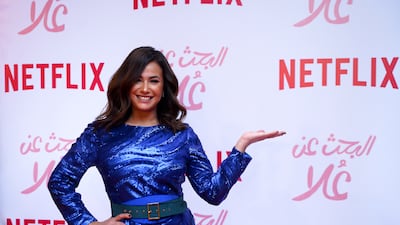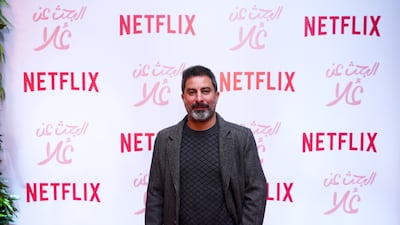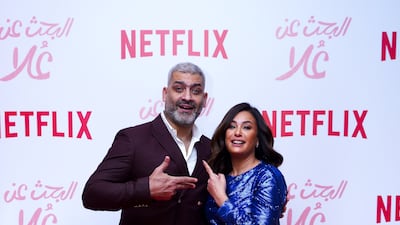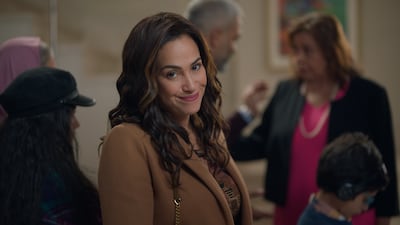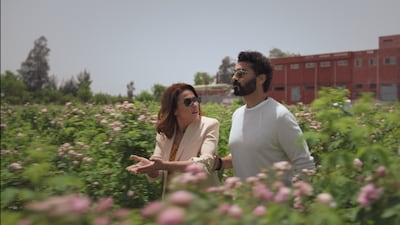Married life did not turn out quite as planned for Ola Abdel Sabour, the young pharmacist from the 2010 hit show Ayza Atgawez (I want to get married).
In it, the character went through a string of romantic misadventures in a bid to get married before turning 30. Now, in the Netflix revamp released on Thursday, we find Ola with a husband and two children.
From the outside, she seems to have achieved the life she dreamt for herself in the original series, but as the cracks in her family’s relationship begin to appear, Ola has to reckon with how much of herself she has given up.
As the show’s title Finding Ola implies, the Arabic Netflix Original revolves around the character's attempts to rediscover herself in the wake of an event that upends the life she so meticulously tried to build.
Tunisian actress Hend Sabry, who reprises her role as the titular character, says Finding Ola is not a second season to the original series. Rather, it is a whole new story that reflects on the changes that the Arab world, and particularly women in the region have undergone in the past decade.
“The Arab world has changed completely and not just from a political or geopolitical viewpoint,” Sabry tells The National. “The secret of Ola’s success in the original series is that women her age found her to be relatable.
“The role of women has changed greatly since then, and for the better. There’s more empowerment and women can talk about our issues more. Cinema and productions have opened up to women more and we have more actresses, female directors and producers, as well as writers who are writing about women’s issues.”
Nada Moussa, who plays the role of Nisreen, Ola’s close friend and confidant, says the show reflects on the changing preconceptions of the role of women in society.
“Women don’t need anyone else to complete them,” she says. "They don’t want to just get married. They feel they are complete on their own, and are capable of raising their children on their own. It doesn’t matter if they're married or single or divorced.”
Sabry agrees, saying it was unthinkable for a character as strong-willed and independent as Nisreen to appear on Ayzah Atgawez.

Sabry says Finding Ola also mirrors the evolution of tastes in the region and the “democratisation of fashion”.
“In Ayzah Atgawez, Ola acted and even dressed in a way that mirrored middle-class society at the time. The styling on the show was impeccable,” she says. “Now as the fashion has changed, women shop at stores that did not exist 12 years ago. There’s been a democratisation of fashion across the world since then and you can see that in the show.”
Ghada Abdel Aal, who penned the original series, also wrote the script to Finding Ola alongside Maha Alwazir. She says it was not difficult to return to Ola's world even after more than a decade but found she had to rebuild the character all over again.
"We were excited to put out a show that people could relate to and find familiar," Abdel Aal says. "The character of Ola was very close to people, and we wanted to retain that familiarity even though she changed drastically throughout the years.
"We didn't start from the point after Ayzah Atgawez concluded," Alwazir says. "The story begins more than a decade later so we started thinking about her from the moment she begins her journey in Finding Ola. We didn't think of her as a new character, but we did have to rethink who the character is."
"We wanted to present several societal issues within the show but in a fresh and light-hearted way," Abdel Aal says. "We wanted to keep the humorous and comedic nature of the original series, while being authentically representative of contemporary society."
Sabry says she wasn’t fazed by the fact that Ola’s story is now a Netflix project, dubbed in four languages and subtitled in 32. She says she’d be delighted if viewers from other parts of the world join Ola in her quest at reinventing herself.
“It is a light-hearted story that can be universal, introducing people who are not from the region to see Arab society in a new light,” she says.
“So much of what comes out of the region is related to war and tragedy. It would be nice for other cultures to see us dropping our children at school, having breakfast. There is a warmth to Finding Ola, a warmth that can overcome language and cultural barriers.”



